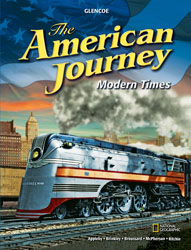
The American Journey Modern Times © 2009Chapter 11: The Depression and the New DealChapter OverviewsSection 1: The Great Depression In the booming economy of the 1920s, many Americans invested in stocks. After a long period of rising stock prices, the stock market crashed in 1929, ushering in the Great Depression. Problems surfaced before the severe economic downturn, as factories overproduced goods and many people relied on credit for their purchases. Large numbers of American workers lost their jobs and experienced poverty in the 1930s. The economic slump affected other countries as well. President Herbert Hoover thought voluntary actions by private citizens and local governments would pull the nation through the hard times. He eventually realized the federal government needed to take more action, so he authorized additional spending on public works. Many Americans, however, believed Hoover was out of touch with the problems of ordinary citizens. Section 2: Roosevelt’s New Deal Franklin D. Roosevelt (FDR) promised a New Deal to get America out of the Great Depression and won the 1932 presidential election in a landslide. During a period called the Hundred Days, Roosevelt quickly launched programs to improve the economy as well as boost American confidence. The New Deal laws that Congress passed affected many areas of American life, including banking, the stock market, industry, agriculture, and welfare. The Great Depression dragged on, but the flurry of New Deal activity restored some confidence. Section 3: Life During the Depression With unemployment at high levels, life during the Depression was difficult for many Americans. In the Great Plains, poor farming practices, a severe drought, and fierce storms turned the area into a “Dust Bowl.” Bankrupt farmers gave up their farms and moved to other parts of the country. During this period, the greatest burden, however, fell on African Americans, Native Americans, and Latinos. At the same time, radical political groups, such as Socialists and Communists, proposed sweeping changes to the economy. The era of the Great Depression was a golden age of entertainment, literature, music, and art. Many radio shows and movies helped people escape their problems, while literature and art focused on social criticism. Section 4: Effects of the New Deal During the mid-1930s, Roosevelt’s New Deal programs faced growing opposition from business leaders who thought government was spending too much. Others, such as Senator Huey Long, proposed taxing the wealthy even more. In response, Roosevelt introduced the Second New Deal that created programs to help the jobless and a Social Security Act to provide welfare for all citizens. These new laws survived a challenge by the Supreme Court, but did not completely solve America’s economic troubles. |  |















